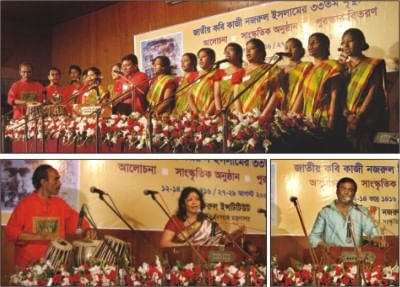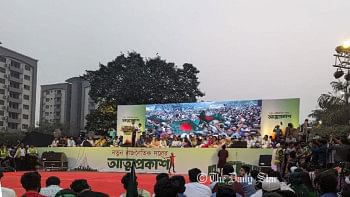Preserving the legacy of the Rebel Poet

(top) A choral rendition of Nazrul songs at the programme. (bottom) Nashid Kamal and Yakub Ali Khan sing at the programme. Photo: Mumit M.
Nazrul Institute observed the death anniversary of our National Poet Kazi Nazrul Islam at Poet Sufia Kamal Auditorium, National Museum on August 27.
The three-day long programme began with the placing of wreaths at the poet's grave early morning on August 27. Later a discussion, titled "Nazrul Jibon: Swaadhinotar Chetona", was held in the afternoon.
Abul Kalam Azad, Minister for Information and Cultural Affairs, was the chief guest while State Minister Pramod Mankin, was special guest. Professor Abdul Khalek presented the keynote paper.
Among others, Sharful Alam, Secretary of the Ministry of Cultural Affairs and Khilkhil Kazi, granddaughter of the poet were present.
The discussion began with a welcome speech by Rashid Haider, executive director of Nazrul Institute. Professor Rafiqul Islam, chairman, Nazrul Institute Trustee Broad, presided over the programme.
Chief guest of the programme handed over "Nazrul Puroshkar 2008" to two eminent personalities Nurjahan Begum, editor of Begum, and Nazrul singer S. M. Ahsan Murshed for their contribution to propagating Nazrul's philosophy.
In his speech, Rashid Haider said, " 'Nazrul Puroshkar' , is a prestigious prize instituted by Nazrul Institute in 1985.”
Abul Kalam Azad said, "Nazrul blazed a trail and emerged like a blazing comet in the sky of Bengali literature."
In his speech, Pramod Mankin said, "The multi- dimensional creations of Nazrul have enriched Bangla literature. The nation will remember his contributions immensely."
Professor Rafiqul Islam outlined different facets of the Rebel Poet with references.
A cultural programme was held after the discussion. Artistes from Nazrul Institute, Chhayanaut and Agnibeena Music School performed "Elo Ramzaner i chand", "Jago amrito piyashichito" and "Ami jug jug dhorey" respectively.
Among noted artistes, Ferdaus Ara, Shaheen Samad, Khalid Hussain, Nashid Kamal and Yakub Ali Khan rendered "Shey choley gechhey boley"; "Chhalo chhalo nayoney"; "Amar jabar shomoy holo"; "Banshitey sur suniye" and "Ogo tar-i torey mon kandey" respectively.
Shimul Mustafa and Laila Afroz recited "Kaandari Hushiar" and "Falguni" in the intervals between the renditions.

 For all latest news, follow The Daily Star's Google News channel.
For all latest news, follow The Daily Star's Google News channel. 



Comments